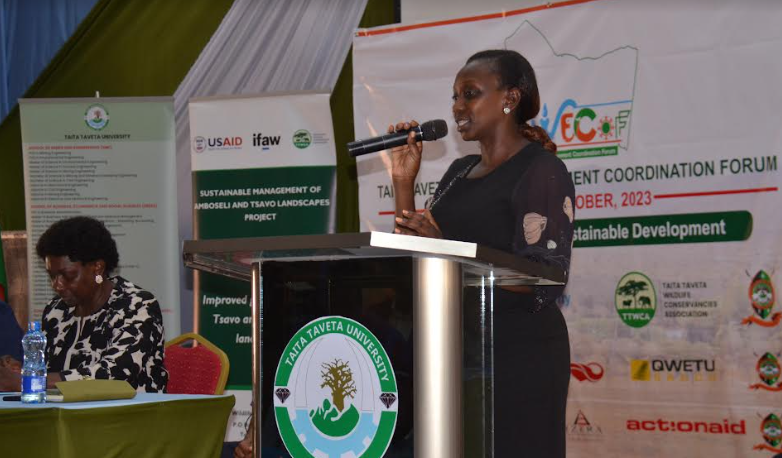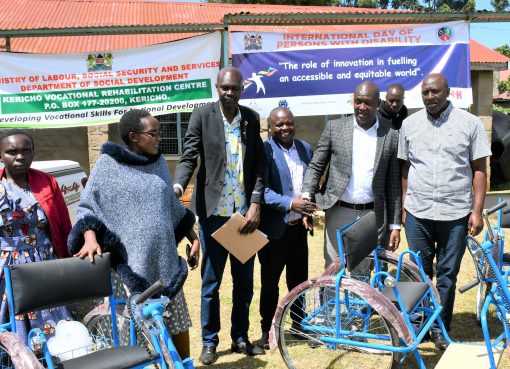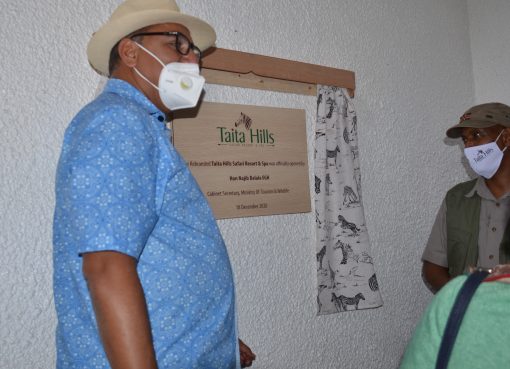Nestled at the heart of the dense indigenous forest atop the scenic Kasighau hills is a nature’s marvel—a series of ancient natural springs christened Lalambela by the local residents. The cool waters from the springs have bubbled down the craggy face of the ancient rocky hills for ages to irrigate parched farms and quench thirst for thousands in the low-lying parched villages.
The permanent springs constitute the backbone of the Bungule Community Water Project, which serves thousands of rural homes in Bungule and Jora villages neighbouring Tsavo National Park in Voi sub-county. During the drought season, the project also serves homes in some parts of Rukanga village.
Mr. Daudi Mwashighadi, Secretary of Bungule Water Project, says the community, through a project committee, is wholly in charge of the project, including operations like billing, distribution, and rehabilitation of sections that need repair.
Despite the success of the project, the bulging human population and wanton degradation occasioned by severe deforestation at Kasighau Hills have become major challenges that require prompt intervention. Such challenges have seen the spring’s yield drop significantly over the years. This reduction in volumes has sometimes led to targeted water rationing, especially during the dry season, to allow refilling of watering troughs for livestock and wild animals.
“The destruction of the sources and felling of trees for charcoal burning has adversely affected the volumes of water in the springs,” he says.
Such challenges characterise the majority of community-owned and operated water projects in Taita-Taveta County. Data from the Department of Water indicates that the county has 112 community water projects. Largely located in rural areas, community water projects serve over 50 per cent of the county population. Urban and semi-urban zones are largely served by Taita-Taveta Water and Sewerage Company (TAVEVO), which is fed by a line from Mzima Springs.
County Executive Committee Member (CECM) for Water and Environment Granton Mwandawiro says community water projects are a pillar that will enable the county government to achieve the ambitious vision of having universal access to clean and affordable water for thousands of residents in the arid county.
Speaking at Taita-Taveta University on Monday during the unveiling of Water, Sanitation, and Hygiene (WASH) at the Environment Coordinating Forum, Mr. Mwandawiro added that monumental challenges facing such water projects, including inadequate funding, management issues, and tackling degradation of water sources, can be effectively addressed if structures are in place to formalise the operations of rural water providers.
“Community water projects are key to enhancing water supply and distribution across the county. Once they are adopted and integrated into a formalised operational system, they can address the issues affecting them,” he says.
Already, the county government has announced plans to formally register rural water providers and transform them into rural water companies. This transition will not only streamline management challenges but also unlock funding that will allow the companies to tackle conservation issues while significantly bolstering service delivery.
In this model, the county will oversee the registration of the companies, including exercising the general advisory and oversight role, while the communities will manage conservation, distribution, billing, and other essential services.
“The main aim is to streamline the distribution exercise across the county and save the sources to ensure sustainable usage of water resources,” he says.
According to the 2019 census, Taita-Taveta County has a population of 340, 000. Only 46 per cent of this population is covered by TAVEVO, the county water company. The remaining 54 per cent is served by the 112 community water projects.
However, the excitement that might come from hopes of improved operations following the planned formalization of community water projects has been dampened by dollops of uncertainty over fears of potential meddling and interference by county officials.
In the past, there have been cases of bitter battles between TAVEVO and some community water projects over ownership and management. Some residents are apprehensive that the county is laying the foundation for taking over community water projects and forcing them to become subsidiaries of TAVEVO. This, they say, will put independent water projects directly under the county government.
We want more details about this initiative and how it will boost community water projects. We hope it will not come with demands that we transfer the management of projects we have owned for decades,” says an official of a community water project in Voi who declined to be named.
Mr. Zacheus Maghanga, the chair of the Voi-based Water Resource Users Association (WRUA), says transforming community water projects into rural water companies needs to be understood in the context of water as a devolved function that puts the community at the centre of all projects.
He adds that the county government ought to assist and bolster proper management of water resources by the communities while offering funding and technical support for projects to thrive. He points out that such a move would take into consideration the unique circumstances surrounding each water project based on location, culture, and needs.
“Most of these water projects are inheritances passed from one generation to another. The need for community sensitization is paramount to avoid the impression of meddling and interference by government officials. This will reduce potential conflict and resistance from the community,” he explains.
Mr. David Kisera, an official from the Water Resource Authority, encouraged the county to develop an extensive water master plan that would map the available water resources and their capacities to meet the needs of the residents. The officials dismissed the widely held opinion that Taita-Taveta is a water-deficit county, noting that the region has adequate ground and underground water resources to meet and surpass local demands.
“This cannot be a water-deficit county. With resources like Lake Challa, Jipe, Mzima Springs, Njoro Springs, and boreholes, the water yield is enough to meet the county’s demands. All we need is to install infrastructure to distribute the water,” he said.
The county has 215 boreholes and 16 shallow wells that supplement the water distributed from the Mzima Springs pipeline.
By Wagema Mwangi





